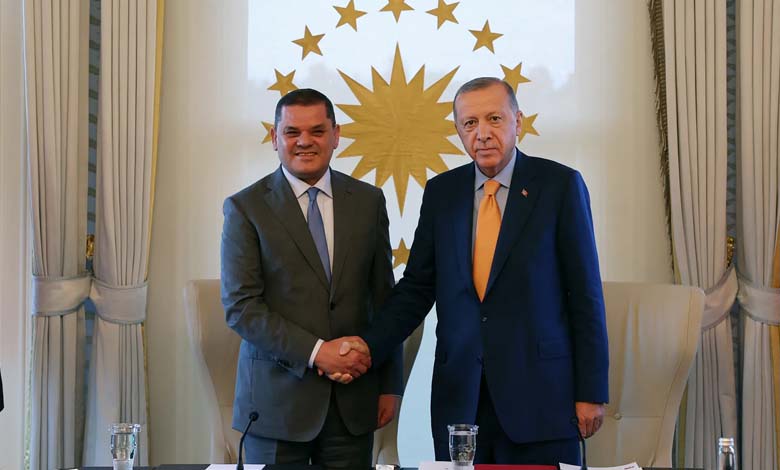A rapprochement between Ankara and the authorities of eastern Libya unsettles the Dbeibah government

The successive visits of Saddam Haftar to Ankara within a short period, as well as the official reception he received, reflect a major and pragmatic shift in Turkey’s policy toward the Libyan file.
-
The Libyan Presidencies Authority: A step toward unity or a new layer of political fragmentation?
-
Haftar links Libyans’ living crisis to political paralysis
These repeated visits by Saddam Haftar, deputy general commander of the Libyan Armed Forces, to Turkey in a brief timeframe, and the official welcome accorded to him, indicate a significant and pragmatic transformation in Ankara’s approach to Libya, and reveal the willingness of both sides to consolidate a military and economic partnership. This notable strategic shift has created confusion within the western government led by Abdelhamid Dbeibah.
After years of supporting the Government of National Accord, and later the expired Government of National Unity, against the forces of Field Marshal Khalifa Haftar, Turkey has opted for a more balanced and realistic policy. Ankara has recognized that the General Command in the East is a stable and influential military force that cannot be ignored in any future settlement. This adjustment is driven by its desire to secure its interests with all influential Libyan actors.
-
Haftar Redraws the Parameters of the Libyan Solution on the Foundations of Sovereignty and National Consensus
-
Warnings of renewed conflict in Libya amid security fragility and sudden violence
Turkey seeks to broaden its economic presence in eastern Libya, particularly in reconstruction and infrastructure projects, rather than limiting its relations to the western government. This rapprochement also helps rebalance its regional role and expand its network of partnerships.
On Friday, Haftar met Turkish Defense Minister Yaşar Güler in Ankara as part of an official visit. The General Command of the Libyan National Army stated that the meeting focused on exchanging assessments of international developments and discussing ways to enhance military cooperation between the two sides, with special attention to regional security challenges and stabilization efforts. Reports have mentioned the signing of military agreements involving training and equipment procurement.
-
The Mufti of Destruction faces his allies: a funding crisis exposes divisions within Libya’s Muslim Brotherhood
-
Renewed Armed Chaos in Libya’s Zawiya: Oil Refinery Caught in the Crossfire
The rapprochement between Turkey and the eastern Libyan authorities is seen as a step into the realm of competition with Russia, which maintains a strong and influential military presence in the region through its direct engagement with Haftar’s forces. Ankara aims to reduce the East’s reliance on other powers and secure a strategic foothold for itself.
These visits also send a clear signal to regional countries, such as Greece, that Turkey is capable of building relations with actors considered allies by these states, thereby strengthening its position in issues such as maritime borders in the eastern Mediterranean.
-
Sabratah in Flames: Western Libya a Prize for Militias as the Non-State Prevails
-
After Years of War… Libya Hosts the African Intelligence Summit
The official reception of eastern Libyan leaders highlights Ankara’s preference for partnerships with organized and stable military institutions, like the General Command, rather than with disparate and undisciplined armed groups operating in some western areas.
Through these visits, Saddam Haftar aims to strengthen the international and regional standing of the General Command forces and to establish himself as a key figure on the Libyan scene, capable of negotiating and concluding agreements at the highest level.
-
Less than half… Attacks deprive the majority of Libyan towns of voting
-
Al-Mishri Denies New Session to Elect Head of Libya’s High Council of State
Eastern forces seek to diversify their sources of military, political, and economic support instead of relying solely on their traditional allies, granting them greater room for maneuver. However, Saddam Haftar’s visits to Ankara have caused concern among some leaders of the Government of National Unity and armed groups in the West, who view them as implicit Turkish recognition of the East’s structured military role.
In a parallel context, Belqassem Haftar, director of the Libyan Fund for Development and Reconstruction, is working to attract foreign investment to eastern Libya. Last Tuesday, he signed a memorandum of understanding in Paris between the Libyan National Development Authority and Business France, before traveling to Moscow on Friday to meet Russian Foreign Minister Sergey Lavrov to discuss cooperation in reconstruction and development fields.
Libyan sources also mention preliminary discussions that may lead to an upcoming visit by Khaled Haftar, newly appointed chief of staff, to Italy in the coming weeks, following an official visit he made to Greece.












